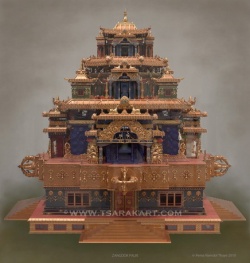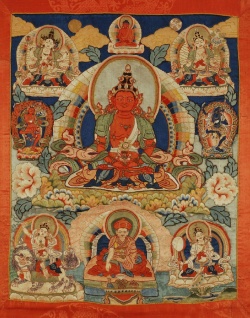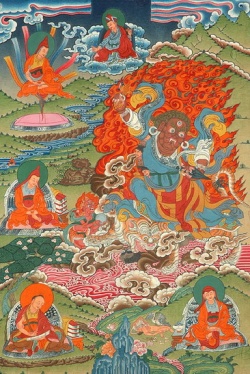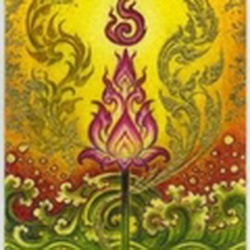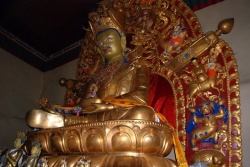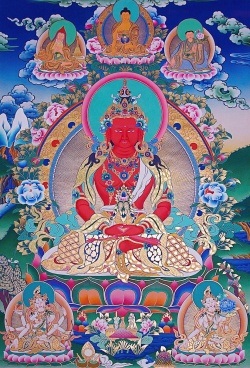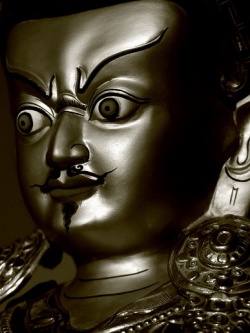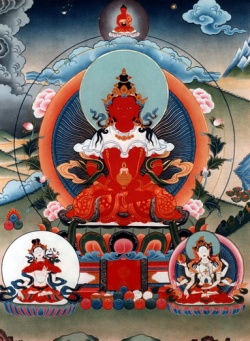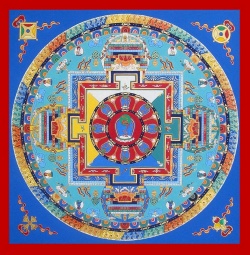Difference between revisions of "Sakka"
(Redirected page to Sākiyā) |
m (Text replacement - "{{Wiki|related}}" to "related") |
||
| (13 intermediate revisions by 4 users not shown) | |||
| Line 1: | Line 1: | ||
| − | + | [[File:Emons.jpg|thumb|250px|]] | |
| + | {{Seealso|Sakka-pañha Sutta: Sakka's Questions}} | ||
| + | <poem> | ||
| + | 1. [[Sakka]] | ||
| + | Almost always spoken of as “devānam indo," chief (or [[king]]) of the [[devas]]. | ||
| + | |||
| + | The [[Samyutta Nikāya]] (S.i.229; DhA.i.264) contains a list of his names: | ||
| + | |||
| + | he is called [[Maghavā]], because as a [[human]] {{Wiki|being}}, in a former [[birth]], he was a {{Wiki|brahmin}} named [[Magha]]. (But see [[Magha]]; cf. [[Sanskrit]] [[Maghavant]] as an [[epithet]] of {{Wiki|Indra}}). | ||
| + | As such he bestowed gifts from [[time]] to [[time]], hence his [[name]] Purindada (Cf. [[Indra's]] [[epithet]] [[Purandara]], destroyer of cities) (generous giver in former [[births]] or giver in towns). | ||
| + | [[File:DokPalri1VIRB.jpg|thumb|250px|]] | ||
| + | Because he gives generously and thoroughly (sakkaccam) he is known as [[Sakka]]. [[Sakra]] occurs many times in the [[Vedas]] as an {{Wiki|adjective}}, qualifying [[gods]] (chiefly [[Indra]]), and is explained as [[meaning]] “able, capable." It is, however, not found as a [[name]] in pre [[Buddhist]] times. | ||
| + | Because he gives away dwelling places (āvasatham) he is called [[Vāsava]] (But see [[Vāsava]]). | ||
| + | Because in one moment he can think of one thousand matters, he is called Sahassakkha (also Sahassanetta). | ||
| + | Because he married the [[Asura]] maiden [[Sujā]], he is called Sujampati. For the romantic story of [[Sakka's]] [[marriage]], see [[Sujā]]. Thus Sujā's father, [[Vepacitti]], became [[Sakka's]] father in law. Several quaint stories are related about father and son in law. The two sometimes quarrelled and at others lived together in [[peace]] (SA.i.265). | ||
| + | [[File:Amitayus11lk.jpg|thumb|250px|]] | ||
| + | Because he governs the [[devas]] of [[Tāvatimsa]] he is called Devānam Indo (See [[Inda]]). | ||
| + | Elsewhere (E.g., D.ii.270; M.i.252) [[Sakka]] is addressed as [[Kosiya]]. | ||
| + | He is also spoken of as [[Yakkha]]. M.i.252; cf. S. i.206 (Sakkanāmako Yakkho); at S. i.47 Māghadevaputta ([[Sakka]]) is called Vatrabhū, slayer of Vrtra (SA.i.83); | ||
| + | [[Sakka]] is also, in the [[Jātakas]], called Gandhabbarāja (J.vi.260) and [[Mahinda]] (J.v.397, 411). | ||
| + | |||
| + | [[Sakka]] rules over [[Tāvatimsa]] [[devaloka]], the lowest [[heaven]] but one of the lower plane. His palace is [[Vejayanta]] and his chariot bears the same [[name]]. Though [[king]] of the [[Tāvatimsa]] [[devas]], he is no [[absolute]] {{Wiki|monarch}}. He is [[imagined]] rather in the likeness of a chieftain of a [[Kosala]] {{Wiki|clan}}. The [[devas]] meet and deliberate in the [[Sudhammā]] sabhā and [[Sakka]] consults with them rather than issues them commands. On such occasions, the Four Regent [[Devas]] are {{Wiki|present}} in the assembly with their followers of the [[Cātummahārājika]] [[world]] (See, e.g., D.ii.207f., 220f). Among the [[Tāvatimsa]] [[devas]], [[Sakka]] is more or less primus inter pares, yet lie surpasses his companions in ten things: length of [[life]], [[beauty]], [[happiness]], renown, [[power]]; and in the {{Wiki|degree}} of his five [[sense]] [[experiences]]: [[sight]], [[hearing]], {{Wiki|smelling}}, {{Wiki|taste}} and {{Wiki|touch}}. A.iv.242; these are also attributed to the rulers of the other [[deva worlds]]. | ||
| + | [[File:Dorje drolo.jpg|thumb|250px|]] | ||
| + | In the [[Samyutta Nikāya]] (S.i.228, 229, 231; cf. Mil. 90; for details of these see [[Magha]]) the [[Buddha]] gives seven rules of conduct, which rules [[Sakka]] carried out as a [[human being]], thus [[attaining]] to his [[celestial]] {{Wiki|sovereignty}}. When the [[devas]] fight the [[Asuras]] they do so under the [[banner]] and orders of [[Sakka]]. For details of [[Sakka's]] conquest of the [[Asuras]] see [[Asura]]. The [[Asuras]] called him [[Jara]] [[Sakka]] (J.i.202). [[Pajāpati]], Vamna and [[Isāna]] are also mentioned as having been associated with him in [[supreme]] command (S.i.219). | ||
| + | [[File:Ch uare.jpg|thumb|250px|]] | ||
| + | In the [[Samyutta Nikāya]] a whole [[Samyutta]] - one of the shortest, consisting of twenty five short [[suttas]] - is devoted to [[Sakka]]. | ||
| + | [[File:De Chapel.jpg|thumb|250px|]] | ||
| + | In the first and second [[suttas]] [[Sakka]] praises [[energy]] ([[viriya]]); | ||
| + | in the third he denounces timidity; | ||
| + | in the fourth he shows [[forbearance]] to his enemy; (*16) | ||
| + | in the fifth lie advocates the conquest of [[anger]] by [[kindness]]; | ||
| + | in the sixth [[kindness]] to [[animals]]; | ||
| + | [[File:X8oo.JPG|thumb|250px|]] | ||
| + | in the seventh he denounces trickery, even towards enemies; | ||
| + | and in the ninth he preaches [[courtesy]] and honour towards the [[wise]]. | ||
| + | In the eleventh are described the seven [[life]] long [[habits]] which raised him to his {{Wiki|present}} {{Wiki|eminent}} position; | ||
| + | twelve and thirteen repeat this and explain his titles. | ||
| + | [[File:D45ac4 z.jpg|thumb|250px|]] | ||
| + | In the fourteenth [[Sakka]] explains how new [[gods]], who outshine the old ones, do so because they have observed the [[Buddha's teaching]]. | ||
| + | In the fifteenth he describes as the most [[beautiful]] spot that where [[arahants]] dwell; | ||
| + | in the sixteenth he praises gifts to the [[Order]] (*17); | ||
| + | in the seventeenth he praises the [[Buddha]], but is told by [[Sahampati]] that he has selected the wrong [[attributes]] for praise. | ||
| + | In eighteen to twenty he says that whereas [[brahmins]] and [[nobles]] on [[earth]] and the [[gods]] of the [[Cātummahārājika]] [[world]] and of [[Tāvatimsa]] {{Wiki|worship}} him, he himself worships good men and [[arahants]]. | ||
| + | Numbers twenty one, twenty two, twenty four and twenty five are against [[anger]], and twenty three is against [[deceit]]. | ||
| + | [[File:Amitayus014.jpg|thumb|250px|]] | ||
| + | *16 The enemy, in this case, is his father-in law, Vepacitta. [[Sakka]] had a reputation for great [[forbearance]]. In [[sutta]] 22 a [[Yakkha]] is said to have come and to have sat on his [[throne]], to [[anger]] him. But [[Sakka]] showed him great honour and the [[Yakkha]] vanished. The Commentary adds (S.A.i.272) that it was no [[Yakkha]], but a [[Rūpāvacara]] [[Brahmā]], named Kodhabhakkha, who had come to test [[Sakka's]] [[patience]]. | ||
| + | [[File:Amitayus-mandala-ie.jpg|thumb|250px|]] | ||
| + | *17 The story connected with this [[sutta]] is that of [[Sakka]], [[seeing]] the [[people]] of [[Anga]] and [[Magadha]] make preparations for a great {{Wiki|sacrifice}} to [[Mahā Brahmā]], [[feels]] [[pity]] for them and comes among them in the guise of [[Brahmā]], advising them to take their [[offerings]] to the [[Buddha]] and seek his counsel (SA.i.270). | ||
| + | |||
| + | These and other passages show that [[Sakka]] was considered by the early [[Buddhists]] as a [[god]] of high [[character]], kindly and just, but not perfect, and not very {{Wiki|intelligent}}. His imperfections are numerous: in [[spite]] of his very great age, (*18) he is still [[subject]] to [[death]] and [[rebirth]] (A.i.144); as an example of this, it is mentioned that Sunetta had thirty five times been [[reborn]] as [[Sakka]] (A.iv.105), a statement confirmed by the [[Buddha]] (A.iv.89). [[Sakka]] is not free from the three deadly [[evils]] - [[lust]], [[ill will]], [[Stupidity]] (*22); nor is he free from [[anxiety]]. He is timid, given to panic, to fright, to running away. (*23) | ||
| + | |||
| + | *18 At J. ii.312, [[Sakka's]] [[life]] is given as lasting thirty million and sixty times one hundred thousand years. | ||
| + | |||
| + | *22 A.i.144. The story of [[Rohini]] shows that [[Sakka]] was very susceptible to the charms of [[beauty]]. He evidently liked other [[people]] to enjoy [[life]] and sent a [[heavenly]] dancer to amuse Mahāpanāda when nobody on [[earth]] could [[accomplish]] that feat (SnA..ii.400). On another occasion, as [[Sakka]] was [[rejoicing]] in his {{Wiki|triumph}} over the [[Asuras]], he saw a crane on a hill top who wished to be able to eat {{Wiki|fish}} without going down into the {{Wiki|stream}}. [[Sakka]] immediately sent the {{Wiki|stream}} in full flood, to the hill top (J.iii.252). | ||
| + | |||
| + | *23 He is mentioned in the [[Jātakas]] as frightened of [[ascetics]] who practised severe penances, lest they should unseat him from his [[throne]], e.g., J. ii.394; also the stories of Visayha, Lomasakassapa, [[Kanha]], [[Akitti]], [[Mahā]] [[Kañcana]] and Isisinga. | ||
| + | |||
| + | In the [[Sakkapañha]] [[Sutta]], [[Sakka]] is said to have visited the [[Buddha]] at [[Vediyagiri]] in Ambasandā and to have asked him a series of questions. He sends [[Pañcasikha]] with his [[vinā]] to play and sing to the [[Buddha]] and to obtain permission for him ([[Sakka]]) to visit him and question him. It was [[Sakka]] who had given the [[Beluvapanduvīnā]] to [[Pañcasikha]] (SnA..ii.394). | ||
| + | |||
| + | The [[Buddha]] says to himself that [[Sakka]], for a long [[time]] {{Wiki|past}}, has led a [[pure]] [[life]], and gives him permission to question him on any [[subject]]. It is stated in the course of the [[sutta]] (D.ii.270) that it was not the first [[time]] that [[Sakka]] had approached the [[Buddha]] for the same [[purpose]]. He had gone to him at the Salaghara in [[Sāvatthi]], but found him in [[meditation]], with [[Bhuñjatī]], wife of [[Vessavana]], waiting on him. He therefore left with a request to [[Bhuñjatī]] to greet the [[Buddha]] in his [[name]]. He also declares (D.ii.286) that he has become a [[sotāpanna]] and has earned for himself the right to be [[reborn]] eventually in the [[Akanitthā]] [[world]], whence he will pass entirely away. | ||
| + | |||
| + | The Commentary says that [[Sakka]] was constantly [[seeing]] the [[Buddha]] and was the most zealous of the [[devas]] in the [[discharge]] of his duties to the [[sāsana]]. DA.iii.697. In the [[sutta]] [[Sakka]] admits (D.ii.284) that he visited other [[brahmins]] and recluses as well. They were [[pleased]] to see him, and boasted that they had [[nothing]] to teach him; but he had to teach them what he knew. But this visit to the [[Buddha]] at [[Vediyagiri]] had a special [[object]]. [[Sakka]] saw sips that his [[life]] was drawing to an end and was frightened by this [[knowledge]]. He therefore went to the [[Buddha]] to seek his help. It adds (DA.iii.732; cp. DhA.iii.270) that, as [[Sakka]] sat listening to the [[Buddha]], he [[died]] in his old [[life]] and was [[reborn]] a new and young [[Sakka]]; only [[Sakka]] himself and the [[Buddha]] was {{Wiki|aware}} of what had happened. The Commentary continues (DA.iii.740) that [[Sakka]] became an "uddham [[sota]]," treading the [[path]] of Anāgāmīs. As such he will [[live]] in [[Avihā]] for one thousand [[kappas]], in [[Atappa]] for two thousand, in [[Sudassanā]] for four thousand, and will end in the [[Akanittha]] [[world]], after having enjoyed [[life]] in the Brahmaworlds for thirty one thousand [[kappas]]. | ||
| + | |||
| + | An account of another interview which [[Sakka]] had with the [[Buddha]] is given in the Cūlatanhāsankhaya [[Sutta]] (q.v.). There the question arises regarding the extirpation of [[cravings]]. [[Sakka]] accepts the [[Buddha's]] answer and leaves him. Anxious to discover whether [[Sakka]] has understood the [[Buddha's teaching]], [[Moggallāna]] visits [[Sakka]] and questions him. [[Sakka]] evades the questions and shows [[Moggallāna]] the glories of his [[Vejayanta]] palace. [[Moggallāna]] then frightens him by a display of iddhi-power, and [[Sakka]] repeats to him, [[word]] for [[word]], the [[Buddha's]] answer. [[Moggallāna]] departs satisfied, and [[Sakka]] tells his handmaidens that [[Moggallāna]] is a "fellow of his" in the [[higher]] [[life]], [[meaning]], probably, that he himself is a [[sotāpanna]] and therefore a kinsman of the [[arahant]]. | ||
| + | |||
| + | In a passage in the [[Samyutta]] (S.i.201) [[Sakka]] is represented as descending from [[heaven]] to make an enquiry about [[Nibbāna]], and in another (S.iv.269f.), as listening, in [[heaven]], to Moggallāna’s [[exposition]] of the simplest duties of a good [[layman]]. On another occasion, at [[Vessavana's]] suggestion, [[Sakka]] visited [[Uttara]] [[Thera]] on the Sankheyyaka Mountain and listened to a {{Wiki|sermon}} by him (A.iv.163f.). See also [[Sakka]] [[Sutta]] (2) and (3). | ||
| + | |||
| + | The later [[books]] contain a good deal of additional [[information]] regarding [[Sakka]]. His city extends for one thousand leagues, and its golden streets are sixty leagues long; his palace [[Vejayanta]] is one thousand leagues high; the [[Sudhammā]] hall covers five hundred leagues, his [[throne]] of yellow marble ([[Pandukambalasilāsana]]) is sixty leagues in extent, his [[white umbrella]] with its golden wreath is five leagues in circumference, and he himself is accompanied by a glorious array of twenty five million [[nymphs]] (J.v.386). Other {{Wiki|features}} of his [[heaven]] are the [[Pāricchattaka]] [[tree]], the [[Nandā]] pokkharanī and the [[Cittalatāvana]] (DA.iii.716; See also [[Tāvatimsa]]). His [[body]] is three gavutas in height (DhA.iii.269); his chief conveyance is the marvellous [[elephant]] {{Wiki|Erāvana}} (q.v.), but he goes to [[war]] in the Velayanta ratha (q.v.). Reference is often made to his [[throne]], the [[Pandukambalasilāsana]] (q.v.), composed of yellow stone. It grows [[hot]] when [[Sakka's]] [[life]] draws towards its end; or his [[merit]] is exhausted; or when some mighty {{Wiki|being}} prays; or, again, through the efficacy of [[virtue]] in recluses or [[brahmins]] or other [[beings]], full of [[potency]]. J. iv.8; when the [[Buddha]], however, sat on it, he was able to conceal it in his robe (DhA.iii.218). | ||
| + | |||
| + | [[Sakka's]] [[devotion]] to the [[Buddha]] and his [[religion]] is proverbial. When the [[Bodhisatta]] cut off his [[hair]] and threw it into the sky, [[Sakka]] took it and deposited it in the Cūlāmani [[cetiya]] (J.i.65). He was {{Wiki|present}} near the [[Bodhi tree]], blowing his Vijayuttara [[sankha]] (q.v.), when [[Māra]] arrived to prevent the [[Buddha]] from reaching [[Enlightenment]] (J.i.72). When the [[Buddha]] accepted Bimbisāra's invitation to dine in his palace, [[Sakka]], in the guise of a young man, preceded the [[Buddha]] and his [[monks]] along the street to the palace, singing the [[Buddha's]] praises (Vin.i.38). When the [[Buddha]] performed his [[Yamaka]] pātihārīya at the foot of the Gandamba, it was [[Sakka]] who built for him a pavilion, and gave orders to the [[gods]] of the [[Wind]] and the {{Wiki|Sun}} to uproot the pavilions of the {{Wiki|heretics}} and [[cause]] them great discomfort (DhA.iii.206, 208). When the [[Buddha]] returned to [[Sankassa]] from [[Tāvatimsa]], whither he went after performing the [[Twin Miracle]], [[Sakka]] created three ladders - of {{Wiki|gold}}, of {{Wiki|silver}}, and of [[jewels]] respectively - for the [[Buddha]] and his retinue (DhA.iii.225). | ||
| + | |||
| + | [[Sakka]] was {{Wiki|present}} at [[Vesāli]] when the [[Buddha]] visited that city in [[order]] to rid it of its plagues. His presence drove away the [[evil]] [[spirits]], and the [[Buddha's]] task was thus made easier (DhA.iii.441). When the [[Buddha]] and his [[monks]] wished to journey one hundred leagues, to visit [[Culla]] [[Subhaddā]] at Uggapura, [[Sakka]], with the aid of [[Vissakamma]], provided them with pavilions (kūtāgāra) in which they might travel by [[air]] (DhA.iii.470). Once, when the ponds in [[Jetavana]] were quite dry, the [[Buddha]] wished to bathe and [[Sakka]] immediately [[caused]] [[rain]] to fall and the ponds were filled (J.i.330). In [[Sakka's]] aspect as [[Vajirapāni]] (q.v.) he protected the [[Buddha]] from the insults of those who came to question him. See also the story of Ciñcā mānavikā, when [[Sakka]] protected the [[Buddha]] from her charges. [[Sakka]] also regarded it as his business to {{Wiki|protect}} the [[Buddha's]] followers, as is shown by the [[manner]] in which he came to the rescue of the four seven year old novices - Sankicca, [[Pandita]], Sopāka and [[Revata]] - when they were made to go hungry by a [[brahmin]] and his wife (DhA.iv.176f.). | ||
| + | |||
| + | During the [[Buddha's]] last {{Wiki|illness}}, [[Sakka]] ministered to him, performing the most menial tasks, such as carrying the vessel of excrement. DhA.iv.269f. He did the same for other {{Wiki|holy}} men - e.g., [[Sāriputta]]. [[Sakka]] also waited on the [[Buddha]] when he was in [[Gayāsīsa]] for the [[conversion]] of the Tebhātikajatilas (Vin.i.28f.); see also the story of Jambuka (DhA.ii.59). The [[Udāna]] (iii.7) contains a story of [[Sakka]] assuming the guise of a poor weaver and [[Sujā]] that of his wife, in [[order]] to give [[alms]] to [[Mahā Kassapa]] who had just risen from a [[trance]]. They succeeded in their ruse, to the great [[joy]] of [[Sakka]] (cp. DhA.i.424f). On other occasions - e.g., in the case of Mahāduggata [[Sakka]] helped poor men to gain [[merit]] by providing them with the means for giving [[alms]] to the [[Buddha]] (DhA.ii.135ff.). | ||
| + | |||
| + | He was {{Wiki|present}} at the [[Buddha's]] [[death]], and uttered, in verse, a simple [[lament]], very different from the studied verses ascribed to [[Brahmā]]. (D.ii.157; on the importance of this verse, however, see Dial.ii.176, n.1). At the distribution, by [[Dona]], of the [[Buddha's relics]], [[Sakka]] saw [[Dona]] hide the [[Buddha's]] right tooth in his turban. [[Realizing]] that [[Dona]] was incapable of rendering adequate honour to the [[relic]], [[Sakka]] took the [[relic]] and deposited it in the [[Cūlāmanicetiya]] (DA.ii.609). And when [[Ajātasattu]] was making arrangements to deposit his share of the [[relics]], [[Sakka]] gave orders to [[Vissakamma]] to set up a vālasanghātayanta for their [[protection]] (DA.ii.613). | ||
| + | |||
| + | [[Sakka]] did all in his [[power]] to help followers of the [[Buddha]] in their strivings for the [[attainment]] of the goal, as in the case of Panditasāmanera, when he sent the Four Regent [[Gods]] to drive away the birds, made the {{Wiki|Moon}} [[deity]] shroud the {{Wiki|moon}}, and himself stood {{Wiki|guard}} at the door of [[Pandita's]] cell, lest he should be disturbed. (DhA.ii.143; cf. the story of [[Sukha]] DhA.iii.96f.). Often, when a [[monk]] achieved his [[ambition]], [[Sakka]] was there to express his [[joy]] and do him honour. See, e.g., the story of Mahāphussa (SnA..i.55f.). | ||
| + | |||
| + | He was ready to help, not only [[monks and nuns]], but also {{Wiki|eminent}} [[laymen]], such as Jotika for whom he built a palace of wondrous [[splendour]], and provided it with every {{Wiki|luxury}} (DhA.iv. 207f). [[Sakka]] was always ready to come to the rescue of the good when in {{Wiki|distress}} - e.g., in the case of Cakkhupāla when he became blind; [[Sakka]] led him by the hand and took him to [[Sāvatthi]]. DhA.i.14f. Many instances are found in the [[Jātaka]] where [[Sakka]] rescued the good in {{Wiki|distress}} - e.g., [[Dhammaddhaja]], [[Guttila]], Kaccāni, the [[Kinnarī]] Candā, Sambulā, Kusa, Mahājanaka's mother, Candakumāra's mother, Candā, and [[Mahosadha]]. | ||
| + | |||
| + | He loved to test the [[goodness]] of men, as in the case of the leper [[Suppabuddha]], to see if their [[faith]] was genuine. DhA.ii.34f.; see also the story of the {{Wiki|courtesan}} in the Kurudhamma [[Jātaka]] (J.ii.380). | ||
| + | |||
| + | The [[Jātaka]] contains several stories of his helping {{Wiki|holy}} men by providing them with hermitages, etc. - e.g., Kuddāla [[pandita]], Hatthipāla, Ayoghara, Jotipāla ([[Sarabhanga]]), Sutasoma, Dukūlaka, Pārikā and [[Vessantara]]. Sometimes, when he found that [[ascetics]] were not diligently practising their duties, he would frighten them - e.g., in the Vighāsa and [[Somadatta]] [[Jātakas]]. The [[Anguttara Nikāya]] (iii.370f ) contains a story of [[Sakka]] punishing a [[deva]] called Supatittha, who lived in a banyan [[tree]], because he failed to keep the [[rukkhadhamma]]. | ||
| + | |||
| + | [[Sakka]] appears as the {{Wiki|guardian}} of [[moral]] law in the [[world]]. When wickedness is rampant among men, or [[kings]] become unrighteous, he appears among them to frighten them so that they may do good instead [[evil]]. He is on the side of the good against the wicked, and often helps them to realize their goal. Instances of this are seen in the Ambacora, Ayakūta, Udaya, Kaccāni, [[Kāma]], Kāmanīta, [[Kumbha]], Kelisīla, Kharaputta, Culladhanuggaha, Dhajavihetha, [[Bilārikosiya]], Manīcora, Mahākanha, Vaka, [[Sarabhanga]], Sarabhamiga and Sudhābhojana [[Jātakas]]. [[Sakka]] patronised good men; some of the more {{Wiki|eminent}} he invited to his [[heaven]], sending his charioteer Matali to fetch them, and he showed them all honour - e.g., [[Guttila]], [[Mandhātā]], Sādhina, and Nimi; others he rewarded suitably - see, e.g., the [[Uraga Jātaka]]. | ||
| + | |||
| + | The [[lesser]] [[gods]] consulted [[Sakka]] in their difficulties and problems e.g., in the case of the [[deity]] of Anāthapindika’s fourth gateway, who incurred the [[displeasure]] of [[Anāthapindika]] by advising him to refrain from too much [[generosity]] towards the [[Buddha]] and his [[monks]] (J.i.229). [[Sakka]] has also to deal with disputes [[arising]] among the [[devas]] themselves (DA.iii.705). On several occasions [[Sakka]] helped the [[Bodhisatta]] in the practice of his [[Perfections]] e.g., as [[King]] Sivi, Temiya, Nimi and [[Vessantara]], also in his [[birth]] as a {{Wiki|hare}}; in this last story, the Sasa [[Jātaka]] (q.v.), [[Sakka]] paints the picture of a {{Wiki|hare}} in the {{Wiki|moon}} to commemorate the [[Bodhisatta's]] {{Wiki|sacrifice}}. | ||
| + | |||
| + | [[Sakka]] sometimes answers the [[prayers]] of good and barren women and gives them sons - e.g., Sumedhā, [[Sīlavatī]], Candādevī. Mention is also made of other boons granted by [[Sakka]] to various persons. Thus in the Mahāsuka [[Jātaka]] he visited the {{Wiki|parrot}} who clung to the [[dead]] stump of a [[tree]] through [[gratitude]], and granted him the boon that the [[tree]] should once more become fruitful (J.iii.493). He granted four boons to [[Kanha]], that he might be [[calm]], bear no [[malice]] or [[hatred]] against his neighbour, [[feel]] no [[greed]] for others' glory, and no [[lust]] towards his neighbour (J.iv.10). To [[Akitti]] he granted several boons, the last of which was that he should have no more visits from [[Sakka]]! (J.iv.240f). When Sivi became blind, [[Sakka]] gave him two [[eyes]]; these were not natural [[eyes]], but the [[eyes]] of [[Truth]], [[Absolute]] and Perfect (saccapāramitā cakkhunī). [[Sakka]] confesses that he has not the [[power]] of restoring [[sight]]; it was the [[virtue]] of Sivi himself which had that [[power]] (J.iv.410f). When [[Sīlavatī]] wished for a boon, [[Sakka]], took her to [[heaven]], where he kept her for seven days; then he granted that she should have two sons, one [[wise]] and ugly and the other a fool and handsome. He also presented her with a piece of kusa grass, a [[heavenly]] robe, a piece of {{Wiki|sandalwood}}, the [[flower]] of the [[Pāricchattaka]] [[tree]] and a Kokanda lute. All this passed into the possession of Kusa, and, later, [[Sakka]] gave him the [[Verocana]] [[jewel]] (J.v.280f., 310). He gave Phusatī, mother of [[Vessantara]], ten boons (J.vi.481f) and to [[Vessantara]] himself he gave eight (J.vi.572). | ||
| + | |||
| + | In the [[Sarabhanga]] [[Jātaka]] (J.v.392) mention is made of four daughters of [[Sakka]] - Āsā, [[Saddhā]], Hirī and Sirī. His wife, [[Sujā]], accompanied him everywhere on his travels (E.g., J. iii.491), even into the [[world]] of men, because that was the boon she had asked for on her [[marriage]] to him (DhA.i.279). [[Vessavana]] was [[Sakka's]] special [[friend]] (MA.i.476f), and when one [[Vessavana]] [[died]], it was [[Sakka's]] [[duty]] to appoint a successor (J.i.328). Matāli (q.v.) is [[Sakka's]] charioteer and [[constant]] companion. [[Vissakamma]] (q.v.) is his "handy man." [[Sakka]] has twenty five million handmaids and five hundred dove-footed [[nymphs]] (kakutapādiniyo), famed for their [[beauty]]. It was the [[sight]] of these which tempted the [[Buddha's]] step brother, [[Nanda]], to give up [[thoughts]] of [[Janapadakalyānī]] [[Nandā]] (J.ii.93). [[Sakka's]] special weapon is the Vajirāvudha and his special [[drum]] the [[Ālambara]] (q.v.). | ||
| + | |||
| + | His {{Wiki|voice}} is [[sweet]], like the tintinnabulation of golden [[bells]] (SA.i.273). | ||
| + | |||
| + | It is [[Sakka's]] special [[duty]] to {{Wiki|protect}} the [[religion]] of the [[Buddha]] in [[Ceylon]]. As the [[Buddha]] lay dying, he enjoined on [[Sakka]] the task of looking after [[Vijaya]] and his successors. This [[duty]] [[Sakka]], in turn, entrusted to the [[god]] [[Uppalavanna]] (Mhv.vii.1ff). [[Sakka]] informed [[Mahinda]] of the right moment for his visit to [[Ceylon]] (Mhv.Xiii.15). When [[Devānampiyatissa]] wished for [[relics]] to place in the Thūpārāma [[Thūpa]], [[Sumana]] sāmanera visited [[Sakka]] and obtained from him the right collar bone of the [[Buddha]], which [[Sakka]] had placed in the Culāmani [[cetiya]] (Mhv.Xvii.9ff). Again, when [[Dutthagāmanī]] was in need of building materials for the [[Mahā Thūpa]], it was [[Sakka]] who supplied them (Mhv.Xxviii.6ff). On the occasion of the enshrining of the [[relics]] in the [[Mahā Thūpa]], [[Sakka]] gave orders to [[Vissakamma]] to decorate the whole of [[Ceylon]]. He also provided the [[throne]] and casket of {{Wiki|gold}} for the [[relics]] brought from the [[Nāgā]] [[world]] by Sonuttara and was himself {{Wiki|present}} at the {{Wiki|festival}}, blowing his [[conch shell]]. (Mhv.Xxxi.34, 75, 78) | ||
| + | |||
| + | Other [[Cakkavālas]] have also their [[Sakka]] (aññehi Cakkavālehi Sakkā Āgacchanti; J.i.203.), and in one place (J.i.204) mention is made of many thousands of [[Sakkas]]. | ||
| + | |||
| + | It is evident from the foregoing account that, as {{Wiki|Rhys Davids}} suggests (Dial.ii.297f), [[Sakka]] and [[Indra]] are {{Wiki|independent}} conceptions. None of the personal {{Wiki|characteristics}} of [[Sakka]] resemble those of [[Indra]]. Some {{Wiki|epithets}} are [[identical]] but are evidently borrowed, though they are differently explained. The {{Wiki|conception}} of the popular [[god]] which appealed to a more barbarous age and to the {{Wiki|clans}} fighting their way into a new country, seems to have been softened and refined in [[order]] to meet the ideals of a more cultured and [[peaceful]] {{Wiki|civilization}}. The old [[name]] no longer fitted the new [[god]], and, as [[time]] went on, [[Sakka]] came to be regarded as an entirely separate [[god]]. | ||
| + | |||
| + | 2. [[Sakka]]. A [[Yakkha]]. See [[Sakka]] [[Sutta]] (1). | ||
| + | |||
| + | 3. [[Sakka]]. Another [[form]] of [[Sākya]]. E.g., A.iv.195; v.334. | ||
| + | </poem> | ||
| + | {{R}} | ||
| + | [http://www.what-buddha-said.net/library/DPPN/sa/sakka.htm /www.what-buddha-said.net] | ||
| + | [[Category:Shakra]] | ||
Latest revision as of 15:45, 31 December 2014
- See also :
- See also :
1. Sakka
Almost always spoken of as “devānam indo," chief (or king) of the devas.
The Samyutta Nikāya (S.i.229; DhA.i.264) contains a list of his names:
he is called Maghavā, because as a human being, in a former birth, he was a brahmin named Magha. (But see Magha; cf. Sanskrit Maghavant as an epithet of Indra).
As such he bestowed gifts from time to time, hence his name Purindada (Cf. Indra's epithet Purandara, destroyer of cities) (generous giver in former births or giver in towns).
Because he gives generously and thoroughly (sakkaccam) he is known as Sakka. Sakra occurs many times in the Vedas as an adjective, qualifying gods (chiefly Indra), and is explained as meaning “able, capable." It is, however, not found as a name in pre Buddhist times.
Because he gives away dwelling places (āvasatham) he is called Vāsava (But see Vāsava).
Because in one moment he can think of one thousand matters, he is called Sahassakkha (also Sahassanetta).
Because he married the Asura maiden Sujā, he is called Sujampati. For the romantic story of Sakka's marriage, see Sujā. Thus Sujā's father, Vepacitti, became Sakka's father in law. Several quaint stories are related about father and son in law. The two sometimes quarrelled and at others lived together in peace (SA.i.265).
Because he governs the devas of Tāvatimsa he is called Devānam Indo (See Inda).
Elsewhere (E.g., D.ii.270; M.i.252) Sakka is addressed as Kosiya.
He is also spoken of as Yakkha. M.i.252; cf. S. i.206 (Sakkanāmako Yakkho); at S. i.47 Māghadevaputta (Sakka) is called Vatrabhū, slayer of Vrtra (SA.i.83);
Sakka is also, in the Jātakas, called Gandhabbarāja (J.vi.260) and Mahinda (J.v.397, 411).
Sakka rules over Tāvatimsa devaloka, the lowest heaven but one of the lower plane. His palace is Vejayanta and his chariot bears the same name. Though king of the Tāvatimsa devas, he is no absolute monarch. He is imagined rather in the likeness of a chieftain of a Kosala clan. The devas meet and deliberate in the Sudhammā sabhā and Sakka consults with them rather than issues them commands. On such occasions, the Four Regent Devas are present in the assembly with their followers of the Cātummahārājika world (See, e.g., D.ii.207f., 220f). Among the Tāvatimsa devas, Sakka is more or less primus inter pares, yet lie surpasses his companions in ten things: length of life, beauty, happiness, renown, power; and in the degree of his five sense experiences: sight, hearing, smelling, taste and touch. A.iv.242; these are also attributed to the rulers of the other deva worlds.
In the Samyutta Nikāya (S.i.228, 229, 231; cf. Mil. 90; for details of these see Magha) the Buddha gives seven rules of conduct, which rules Sakka carried out as a human being, thus attaining to his celestial sovereignty. When the devas fight the Asuras they do so under the banner and orders of Sakka. For details of Sakka's conquest of the Asuras see Asura. The Asuras called him Jara Sakka (J.i.202). Pajāpati, Vamna and Isāna are also mentioned as having been associated with him in supreme command (S.i.219).
In the Samyutta Nikāya a whole Samyutta - one of the shortest, consisting of twenty five short suttas - is devoted to Sakka.
In the first and second suttas Sakka praises energy (viriya);
in the third he denounces timidity;
in the fourth he shows forbearance to his enemy; (*16)
in the fifth lie advocates the conquest of anger by kindness;
in the sixth kindness to animals;
in the seventh he denounces trickery, even towards enemies;
and in the ninth he preaches courtesy and honour towards the wise.
In the eleventh are described the seven life long habits which raised him to his present eminent position;
twelve and thirteen repeat this and explain his titles.
In the fourteenth Sakka explains how new gods, who outshine the old ones, do so because they have observed the Buddha's teaching.
In the fifteenth he describes as the most beautiful spot that where arahants dwell;
in the sixteenth he praises gifts to the Order (*17);
in the seventeenth he praises the Buddha, but is told by Sahampati that he has selected the wrong attributes for praise.
In eighteen to twenty he says that whereas brahmins and nobles on earth and the gods of the Cātummahārājika world and of Tāvatimsa worship him, he himself worships good men and arahants.
Numbers twenty one, twenty two, twenty four and twenty five are against anger, and twenty three is against deceit.
*16 The enemy, in this case, is his father-in law, Vepacitta. Sakka had a reputation for great forbearance. In sutta 22 a Yakkha is said to have come and to have sat on his throne, to anger him. But Sakka showed him great honour and the Yakkha vanished. The Commentary adds (S.A.i.272) that it was no Yakkha, but a Rūpāvacara Brahmā, named Kodhabhakkha, who had come to test Sakka's patience.
*17 The story connected with this sutta is that of Sakka, seeing the people of Anga and Magadha make preparations for a great sacrifice to Mahā Brahmā, feels pity for them and comes among them in the guise of Brahmā, advising them to take their offerings to the Buddha and seek his counsel (SA.i.270).
These and other passages show that Sakka was considered by the early Buddhists as a god of high character, kindly and just, but not perfect, and not very intelligent. His imperfections are numerous: in spite of his very great age, (*18) he is still subject to death and rebirth (A.i.144); as an example of this, it is mentioned that Sunetta had thirty five times been reborn as Sakka (A.iv.105), a statement confirmed by the Buddha (A.iv.89). Sakka is not free from the three deadly evils - lust, ill will, Stupidity (*22); nor is he free from anxiety. He is timid, given to panic, to fright, to running away. (*23)
*18 At J. ii.312, Sakka's life is given as lasting thirty million and sixty times one hundred thousand years.
*22 A.i.144. The story of Rohini shows that Sakka was very susceptible to the charms of beauty. He evidently liked other people to enjoy life and sent a heavenly dancer to amuse Mahāpanāda when nobody on earth could accomplish that feat (SnA..ii.400). On another occasion, as Sakka was rejoicing in his triumph over the Asuras, he saw a crane on a hill top who wished to be able to eat fish without going down into the stream. Sakka immediately sent the stream in full flood, to the hill top (J.iii.252).
*23 He is mentioned in the Jātakas as frightened of ascetics who practised severe penances, lest they should unseat him from his throne, e.g., J. ii.394; also the stories of Visayha, Lomasakassapa, Kanha, Akitti, Mahā Kañcana and Isisinga.
In the Sakkapañha Sutta, Sakka is said to have visited the Buddha at Vediyagiri in Ambasandā and to have asked him a series of questions. He sends Pañcasikha with his vinā to play and sing to the Buddha and to obtain permission for him (Sakka) to visit him and question him. It was Sakka who had given the Beluvapanduvīnā to Pañcasikha (SnA..ii.394).
The Buddha says to himself that Sakka, for a long time past, has led a pure life, and gives him permission to question him on any subject. It is stated in the course of the sutta (D.ii.270) that it was not the first time that Sakka had approached the Buddha for the same purpose. He had gone to him at the Salaghara in Sāvatthi, but found him in meditation, with Bhuñjatī, wife of Vessavana, waiting on him. He therefore left with a request to Bhuñjatī to greet the Buddha in his name. He also declares (D.ii.286) that he has become a sotāpanna and has earned for himself the right to be reborn eventually in the Akanitthā world, whence he will pass entirely away.
The Commentary says that Sakka was constantly seeing the Buddha and was the most zealous of the devas in the discharge of his duties to the sāsana. DA.iii.697. In the sutta Sakka admits (D.ii.284) that he visited other brahmins and recluses as well. They were pleased to see him, and boasted that they had nothing to teach him; but he had to teach them what he knew. But this visit to the Buddha at Vediyagiri had a special object. Sakka saw sips that his life was drawing to an end and was frightened by this knowledge. He therefore went to the Buddha to seek his help. It adds (DA.iii.732; cp. DhA.iii.270) that, as Sakka sat listening to the Buddha, he died in his old life and was reborn a new and young Sakka; only Sakka himself and the Buddha was aware of what had happened. The Commentary continues (DA.iii.740) that Sakka became an "uddham sota," treading the path of Anāgāmīs. As such he will live in Avihā for one thousand kappas, in Atappa for two thousand, in Sudassanā for four thousand, and will end in the Akanittha world, after having enjoyed life in the Brahmaworlds for thirty one thousand kappas.
An account of another interview which Sakka had with the Buddha is given in the Cūlatanhāsankhaya Sutta (q.v.). There the question arises regarding the extirpation of cravings. Sakka accepts the Buddha's answer and leaves him. Anxious to discover whether Sakka has understood the Buddha's teaching, Moggallāna visits Sakka and questions him. Sakka evades the questions and shows Moggallāna the glories of his Vejayanta palace. Moggallāna then frightens him by a display of iddhi-power, and Sakka repeats to him, word for word, the Buddha's answer. Moggallāna departs satisfied, and Sakka tells his handmaidens that Moggallāna is a "fellow of his" in the higher life, meaning, probably, that he himself is a sotāpanna and therefore a kinsman of the arahant.
In a passage in the Samyutta (S.i.201) Sakka is represented as descending from heaven to make an enquiry about Nibbāna, and in another (S.iv.269f.), as listening, in heaven, to Moggallāna’s exposition of the simplest duties of a good layman. On another occasion, at Vessavana's suggestion, Sakka visited Uttara Thera on the Sankheyyaka Mountain and listened to a sermon by him (A.iv.163f.). See also Sakka Sutta (2) and (3).
The later books contain a good deal of additional information regarding Sakka. His city extends for one thousand leagues, and its golden streets are sixty leagues long; his palace Vejayanta is one thousand leagues high; the Sudhammā hall covers five hundred leagues, his throne of yellow marble (Pandukambalasilāsana) is sixty leagues in extent, his white umbrella with its golden wreath is five leagues in circumference, and he himself is accompanied by a glorious array of twenty five million nymphs (J.v.386). Other features of his heaven are the Pāricchattaka tree, the Nandā pokkharanī and the Cittalatāvana (DA.iii.716; See also Tāvatimsa). His body is three gavutas in height (DhA.iii.269); his chief conveyance is the marvellous elephant Erāvana (q.v.), but he goes to war in the Velayanta ratha (q.v.). Reference is often made to his throne, the Pandukambalasilāsana (q.v.), composed of yellow stone. It grows hot when Sakka's life draws towards its end; or his merit is exhausted; or when some mighty being prays; or, again, through the efficacy of virtue in recluses or brahmins or other beings, full of potency. J. iv.8; when the Buddha, however, sat on it, he was able to conceal it in his robe (DhA.iii.218).
Sakka's devotion to the Buddha and his religion is proverbial. When the Bodhisatta cut off his hair and threw it into the sky, Sakka took it and deposited it in the Cūlāmani cetiya (J.i.65). He was present near the Bodhi tree, blowing his Vijayuttara sankha (q.v.), when Māra arrived to prevent the Buddha from reaching Enlightenment (J.i.72). When the Buddha accepted Bimbisāra's invitation to dine in his palace, Sakka, in the guise of a young man, preceded the Buddha and his monks along the street to the palace, singing the Buddha's praises (Vin.i.38). When the Buddha performed his Yamaka pātihārīya at the foot of the Gandamba, it was Sakka who built for him a pavilion, and gave orders to the gods of the Wind and the Sun to uproot the pavilions of the heretics and cause them great discomfort (DhA.iii.206, 208). When the Buddha returned to Sankassa from Tāvatimsa, whither he went after performing the Twin Miracle, Sakka created three ladders - of gold, of silver, and of jewels respectively - for the Buddha and his retinue (DhA.iii.225).
Sakka was present at Vesāli when the Buddha visited that city in order to rid it of its plagues. His presence drove away the evil spirits, and the Buddha's task was thus made easier (DhA.iii.441). When the Buddha and his monks wished to journey one hundred leagues, to visit Culla Subhaddā at Uggapura, Sakka, with the aid of Vissakamma, provided them with pavilions (kūtāgāra) in which they might travel by air (DhA.iii.470). Once, when the ponds in Jetavana were quite dry, the Buddha wished to bathe and Sakka immediately caused rain to fall and the ponds were filled (J.i.330). In Sakka's aspect as Vajirapāni (q.v.) he protected the Buddha from the insults of those who came to question him. See also the story of Ciñcā mānavikā, when Sakka protected the Buddha from her charges. Sakka also regarded it as his business to protect the Buddha's followers, as is shown by the manner in which he came to the rescue of the four seven year old novices - Sankicca, Pandita, Sopāka and Revata - when they were made to go hungry by a brahmin and his wife (DhA.iv.176f.).
During the Buddha's last illness, Sakka ministered to him, performing the most menial tasks, such as carrying the vessel of excrement. DhA.iv.269f. He did the same for other holy men - e.g., Sāriputta. Sakka also waited on the Buddha when he was in Gayāsīsa for the conversion of the Tebhātikajatilas (Vin.i.28f.); see also the story of Jambuka (DhA.ii.59). The Udāna (iii.7) contains a story of Sakka assuming the guise of a poor weaver and Sujā that of his wife, in order to give alms to Mahā Kassapa who had just risen from a trance. They succeeded in their ruse, to the great joy of Sakka (cp. DhA.i.424f). On other occasions - e.g., in the case of Mahāduggata Sakka helped poor men to gain merit by providing them with the means for giving alms to the Buddha (DhA.ii.135ff.).
He was present at the Buddha's death, and uttered, in verse, a simple lament, very different from the studied verses ascribed to Brahmā. (D.ii.157; on the importance of this verse, however, see Dial.ii.176, n.1). At the distribution, by Dona, of the Buddha's relics, Sakka saw Dona hide the Buddha's right tooth in his turban. Realizing that Dona was incapable of rendering adequate honour to the relic, Sakka took the relic and deposited it in the Cūlāmanicetiya (DA.ii.609). And when Ajātasattu was making arrangements to deposit his share of the relics, Sakka gave orders to Vissakamma to set up a vālasanghātayanta for their protection (DA.ii.613).
Sakka did all in his power to help followers of the Buddha in their strivings for the attainment of the goal, as in the case of Panditasāmanera, when he sent the Four Regent Gods to drive away the birds, made the Moon deity shroud the moon, and himself stood guard at the door of Pandita's cell, lest he should be disturbed. (DhA.ii.143; cf. the story of Sukha DhA.iii.96f.). Often, when a monk achieved his ambition, Sakka was there to express his joy and do him honour. See, e.g., the story of Mahāphussa (SnA..i.55f.).
He was ready to help, not only monks and nuns, but also eminent laymen, such as Jotika for whom he built a palace of wondrous splendour, and provided it with every luxury (DhA.iv. 207f). Sakka was always ready to come to the rescue of the good when in distress - e.g., in the case of Cakkhupāla when he became blind; Sakka led him by the hand and took him to Sāvatthi. DhA.i.14f. Many instances are found in the Jātaka where Sakka rescued the good in distress - e.g., Dhammaddhaja, Guttila, Kaccāni, the Kinnarī Candā, Sambulā, Kusa, Mahājanaka's mother, Candakumāra's mother, Candā, and Mahosadha.
He loved to test the goodness of men, as in the case of the leper Suppabuddha, to see if their faith was genuine. DhA.ii.34f.; see also the story of the courtesan in the Kurudhamma Jātaka (J.ii.380).
The Jātaka contains several stories of his helping holy men by providing them with hermitages, etc. - e.g., Kuddāla pandita, Hatthipāla, Ayoghara, Jotipāla (Sarabhanga), Sutasoma, Dukūlaka, Pārikā and Vessantara. Sometimes, when he found that ascetics were not diligently practising their duties, he would frighten them - e.g., in the Vighāsa and Somadatta Jātakas. The Anguttara Nikāya (iii.370f ) contains a story of Sakka punishing a deva called Supatittha, who lived in a banyan tree, because he failed to keep the rukkhadhamma.
Sakka appears as the guardian of moral law in the world. When wickedness is rampant among men, or kings become unrighteous, he appears among them to frighten them so that they may do good instead evil. He is on the side of the good against the wicked, and often helps them to realize their goal. Instances of this are seen in the Ambacora, Ayakūta, Udaya, Kaccāni, Kāma, Kāmanīta, Kumbha, Kelisīla, Kharaputta, Culladhanuggaha, Dhajavihetha, Bilārikosiya, Manīcora, Mahākanha, Vaka, Sarabhanga, Sarabhamiga and Sudhābhojana Jātakas. Sakka patronised good men; some of the more eminent he invited to his heaven, sending his charioteer Matali to fetch them, and he showed them all honour - e.g., Guttila, Mandhātā, Sādhina, and Nimi; others he rewarded suitably - see, e.g., the Uraga Jātaka.
The lesser gods consulted Sakka in their difficulties and problems e.g., in the case of the deity of Anāthapindika’s fourth gateway, who incurred the displeasure of Anāthapindika by advising him to refrain from too much generosity towards the Buddha and his monks (J.i.229). Sakka has also to deal with disputes arising among the devas themselves (DA.iii.705). On several occasions Sakka helped the Bodhisatta in the practice of his Perfections e.g., as King Sivi, Temiya, Nimi and Vessantara, also in his birth as a hare; in this last story, the Sasa Jātaka (q.v.), Sakka paints the picture of a hare in the moon to commemorate the Bodhisatta's sacrifice.
Sakka sometimes answers the prayers of good and barren women and gives them sons - e.g., Sumedhā, Sīlavatī, Candādevī. Mention is also made of other boons granted by Sakka to various persons. Thus in the Mahāsuka Jātaka he visited the parrot who clung to the dead stump of a tree through gratitude, and granted him the boon that the tree should once more become fruitful (J.iii.493). He granted four boons to Kanha, that he might be calm, bear no malice or hatred against his neighbour, feel no greed for others' glory, and no lust towards his neighbour (J.iv.10). To Akitti he granted several boons, the last of which was that he should have no more visits from Sakka! (J.iv.240f). When Sivi became blind, Sakka gave him two eyes; these were not natural eyes, but the eyes of Truth, Absolute and Perfect (saccapāramitā cakkhunī). Sakka confesses that he has not the power of restoring sight; it was the virtue of Sivi himself which had that power (J.iv.410f). When Sīlavatī wished for a boon, Sakka, took her to heaven, where he kept her for seven days; then he granted that she should have two sons, one wise and ugly and the other a fool and handsome. He also presented her with a piece of kusa grass, a heavenly robe, a piece of sandalwood, the flower of the Pāricchattaka tree and a Kokanda lute. All this passed into the possession of Kusa, and, later, Sakka gave him the Verocana jewel (J.v.280f., 310). He gave Phusatī, mother of Vessantara, ten boons (J.vi.481f) and to Vessantara himself he gave eight (J.vi.572).
In the Sarabhanga Jātaka (J.v.392) mention is made of four daughters of Sakka - Āsā, Saddhā, Hirī and Sirī. His wife, Sujā, accompanied him everywhere on his travels (E.g., J. iii.491), even into the world of men, because that was the boon she had asked for on her marriage to him (DhA.i.279). Vessavana was Sakka's special friend (MA.i.476f), and when one Vessavana died, it was Sakka's duty to appoint a successor (J.i.328). Matāli (q.v.) is Sakka's charioteer and constant companion. Vissakamma (q.v.) is his "handy man." Sakka has twenty five million handmaids and five hundred dove-footed nymphs (kakutapādiniyo), famed for their beauty. It was the sight of these which tempted the Buddha's step brother, Nanda, to give up thoughts of Janapadakalyānī Nandā (J.ii.93). Sakka's special weapon is the Vajirāvudha and his special drum the Ālambara (q.v.).
His voice is sweet, like the tintinnabulation of golden bells (SA.i.273).
It is Sakka's special duty to protect the religion of the Buddha in Ceylon. As the Buddha lay dying, he enjoined on Sakka the task of looking after Vijaya and his successors. This duty Sakka, in turn, entrusted to the god Uppalavanna (Mhv.vii.1ff). Sakka informed Mahinda of the right moment for his visit to Ceylon (Mhv.Xiii.15). When Devānampiyatissa wished for relics to place in the Thūpārāma Thūpa, Sumana sāmanera visited Sakka and obtained from him the right collar bone of the Buddha, which Sakka had placed in the Culāmani cetiya (Mhv.Xvii.9ff). Again, when Dutthagāmanī was in need of building materials for the Mahā Thūpa, it was Sakka who supplied them (Mhv.Xxviii.6ff). On the occasion of the enshrining of the relics in the Mahā Thūpa, Sakka gave orders to Vissakamma to decorate the whole of Ceylon. He also provided the throne and casket of gold for the relics brought from the Nāgā world by Sonuttara and was himself present at the festival, blowing his conch shell. (Mhv.Xxxi.34, 75, 78)
Other Cakkavālas have also their Sakka (aññehi Cakkavālehi Sakkā Āgacchanti; J.i.203.), and in one place (J.i.204) mention is made of many thousands of Sakkas.
It is evident from the foregoing account that, as Rhys Davids suggests (Dial.ii.297f), Sakka and Indra are independent conceptions. None of the personal characteristics of Sakka resemble those of Indra. Some epithets are identical but are evidently borrowed, though they are differently explained. The conception of the popular god which appealed to a more barbarous age and to the clans fighting their way into a new country, seems to have been softened and refined in order to meet the ideals of a more cultured and peaceful civilization. The old name no longer fitted the new god, and, as time went on, Sakka came to be regarded as an entirely separate god.
2. Sakka. A Yakkha. See Sakka Sutta (1).
3. Sakka. Another form of Sākya. E.g., A.iv.195; v.334.

